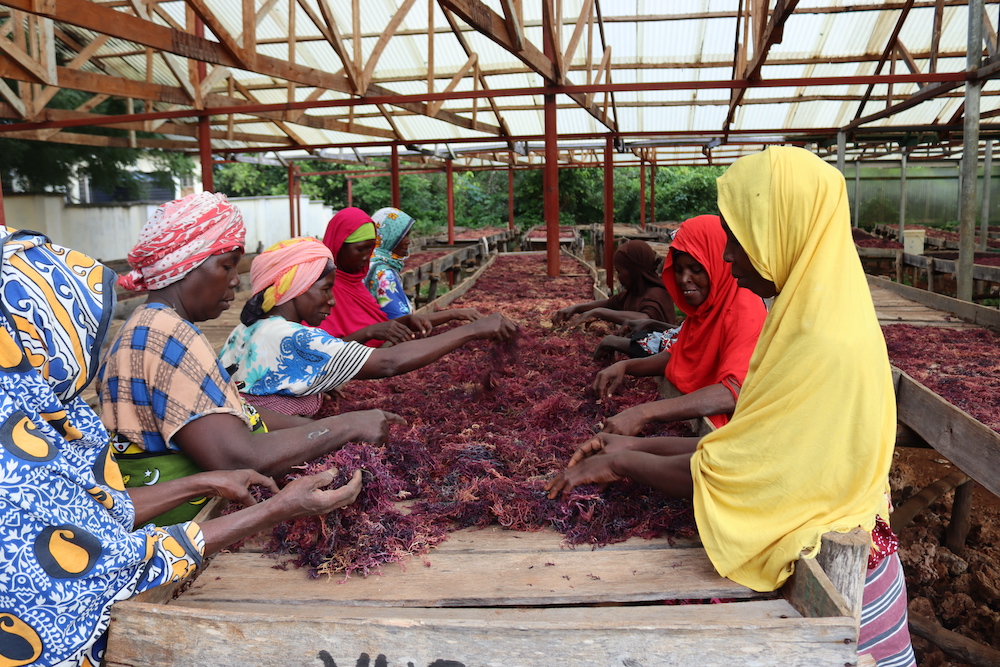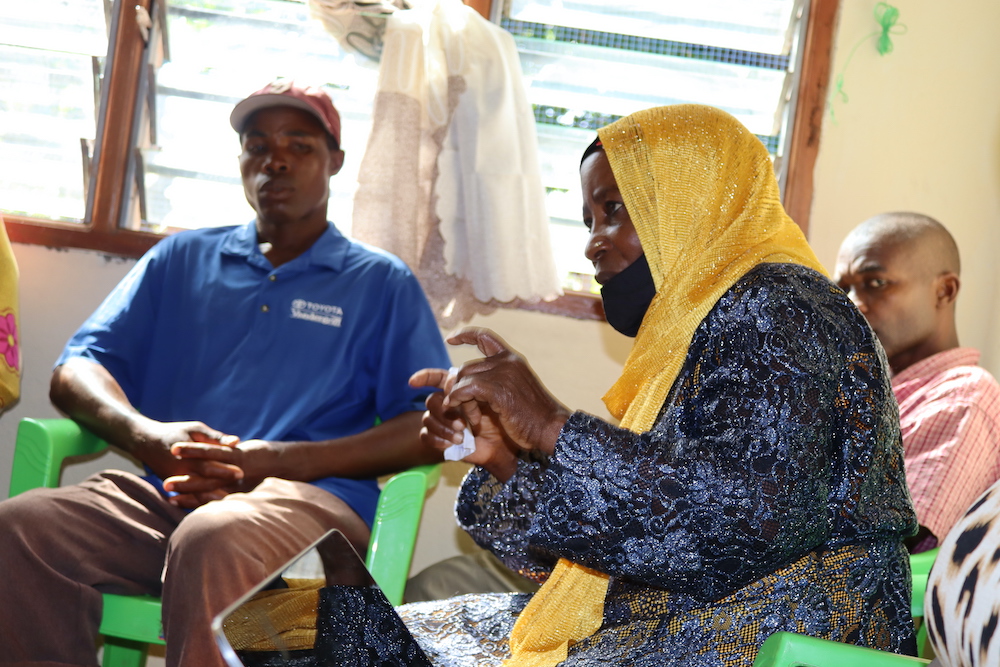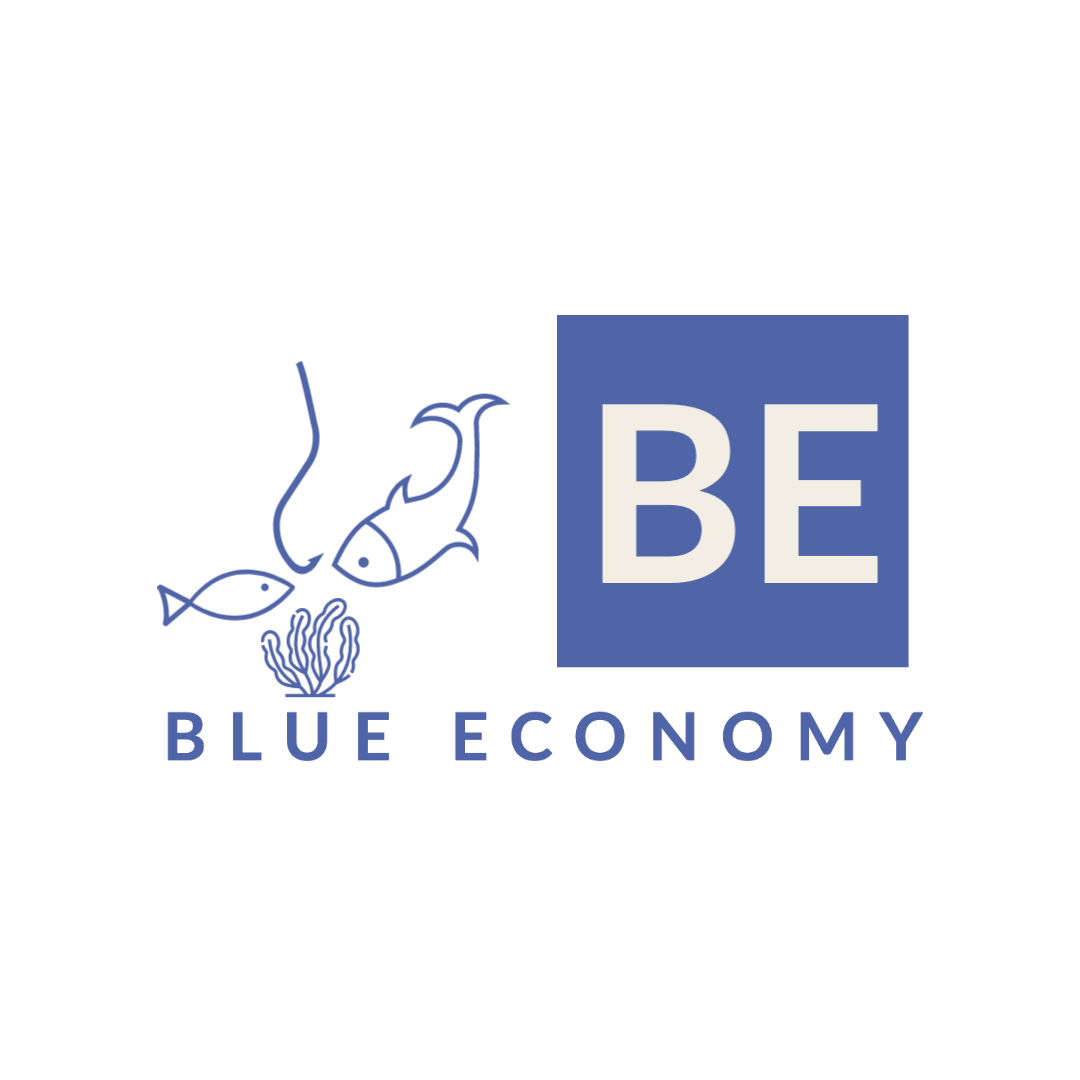Eva Komba, Kenneth Odary and Alfred Oduor
Tucked deep in Kenya’s south coast is Kibuyuni village, home to generations of coastal fisher folks, a place where Fatuma Usi, calls home. Respectfully referred to as Mama, Fatuma, her presence in Kibuyuni is announced by her well-built house constructed of limestone quarry blocks and roofed with tin metal sheets. Standing at four feet seven inches, Mama Fatuma’s diminutive frame and humble demeanour betrays the gentle giant that she is.

Members of Kibuyuni Farmers' Cooperative Society.
Since 2001, Mama Fatuma has been at the front and centre of seaweed farming industry that has slowly taken root across a dozen fishing communities along Kenya’s south coast. To many, Mama Fatuma Usi is many things rolled into one. Indeed, observing her closely, she is not just a seaweed farming pioneer. Fatuma Usi is simultaneously a great visionary, industrialists, community mobiliser, businesswoman, community researcher, community icon, mother, sister, gender advocate, pious woman, concerned citizen yet still a humble resident of Kibuyuni village.
Fatuma’s story comes against a backdrop where women have traditionally faced numerous barriers in accessing, owning and controlling resources. In particular, women have had to contend with the burden of triple gender roles characterized by reproductive, productive and community roles.
The reproductive role of women that includes the care and maintenance of the actual and future workforce of the family (childbearing responsibilities and domestic tasks) has kept them away from the workplace. The productive role of women which relates to work performed by women and men for pay in cash or kind (market production, informal production, home production, subsistence production) has been unfairly compensated. The community managing role of women such as work related to care and unpaid work such as care of children, elderly, persons with disabilities, and provision of collective resources as water, healthcare, remains voluntary. Besides, women also must contend with traditional and structural barriers that worsens their time poverty while devaluing their overall economic contribution at the household level.
Transcending such circumstances is what has made Mama Fatuma a towering figure. Indeed, her productive role as a pioneering seaweed farmer made her an early mentor to other women in Kibuyuni village. By following her example, many village women have become seaweed farmers. This has transformed the fortunes of many households that previously depended singularly on their male/father figure meagre earnings from fishing. Seaweed farming has helped improve the status of women within the Kibuyuni community. It has also generally raised the socio-economic status of coastal communities, with the income from seaweed farming used to send children to school, make improvements to their houses and have more financial security. According to Mama Fatuma’s own accounts, girls in the community are now more likely to go to school than was the case before. Seaweed has created much-needed jobs for women and youth in the community. The success of women- and family-run seaweed farms has been hinged on highly flexible hours of work around the cyclical time scales of the tides and the moon alongside low capital and technological requirements for entry.
Fatuma’s story is even more compelling considering that she has had to raise her sons as a single parent. As a mother of two boys, Fatuma takes pride in taking them through school with the youngest now in his final years at a reputable local high school while her eldest son is set to wed in July 2022 in Ukunda. Mama Fatuma cannot hide her joy and pride when talking about the upcoming wedding. Notably, Mama Fatuma’s is more prominently known for her community role. Typical of women in this position, Mama Fatuma had to work as an unpaid volunteer expect for a short period when she was a paid research assistant. Using knowledge gained from research, Mama Fatuma led other women to start seaweed farming. Her example has now been replicated by both women and men.
The growing interest in seaweed farming sparked blue economy rejuvenation among in the immediate region. Currently, Mama Fatuma sits as the chair of the Kibuyuni seaweed farmers’ cooperative a micro enterprise that has 314 members consisting of 242 women and 72 men. The cooperative has managed to connect farmers with buyers. The cooperative sales figures between 2015 and 2021 show impressive sales figures that have been on an upward trajectory. Besides, the cooperative has done some value addition that has realized different by products that are also sold. All the monies realized from sale of seaweed and by-products have been ploughed back into the organization. The growing equity has been advanced to members as credit for personal and business ventures. Notably, the cooperative has helped women in Kibuyuni achieve financial independence.
Mama Fatuma’s pioneering work has been recognized by national government departments and agencies as well as the county government. Kibuyuni village today hosts a government funded warehouse where the seaweed cooperative processing plant and storage unit are housed. On several occasions Mama Fatuma has received accolades, notably from the President of Kenya, County Governor and other high ranking government functionaries. Several state institutions have also paid homage to Kibuyuni village to bear witness to Mama Fatuma’s blue revolution. In this connection, Kibuyuni seaweed cooperatives has received support from premier government bodies such as the Kenya Marine and Fisheries Research Institute (KMFRI) and the Kenya Industrial Research and Development Institute (KIRDI) in the form of capacity building and equipment. Through private sector partnership with Seaweeds Corporation, the Kibuyuni Seaweeds cooperative has managed to secure a guaranteed market for their products which provides the long-term sustainable jobs for women and youth. In recognition of the work started by Ms. Fatuma, bilateral partners such as the World Bank (WB) and United Nations Industrial Development Office (UNIDO) have also supported various elements of work aimed at improving productivity.

Fatuma Usi during a discussion with members of Kibuyuni Farmers' Cooperative Society
After 21 years, Mama Fatuma’s exploits are far from over. Together with other community members, she is part of a team that established Bahari Community Based organization (CBO). The CBO is a conglomeration of 13 community organizations with mandates ranging from livelihoods, environmental sustainability, vulnerability and education. With a membership of 27, of whom 13 are women, the organization has deliberately integrated women into leadership positions – of course, through the influence of Mama Fatuma.
True to her dynamic nature, Mama Fatuma has added another milestone to her impressive curriculum vitae. She is currently leading Bahari CBO in an initiative that aims to address socio-economic barriers preventing women from accessing and exploiting marine resources in Kenya’s coastal region through adoption of climate-smart integrated multi-trophic aquaculture of seaweeds and fish for improved livelihoods and resilience. The initiative, dubbed Blue Empowerment, is being implemented by a consortium led by the African Centre for Technology Studies (ACTS), an international research organization focusing on harnessing the applications of science, technology and innovation for sustainable development in Africa. Other partners include Kenyatta University (KU), Seaweed Corporation, KIRDI and KMFRI.
Without a doubt, being the visionary leader, Mama Fatuma is strategically positioning to identify and lock more opportunities in the blue economy for Bahari CBO network. Already, she sees the need for the Bahari CBO network to expand its membership and visibility across other counties along Kenya’s coastal strip. In addition, she views Bahari CBO network’s growing profile as another opportunity for collaboration and fundraising. Indeed, the journey travelled by Mama Fatuma can only be summarized as “one small step by a woman, one giant leap for blue empowerment.”
